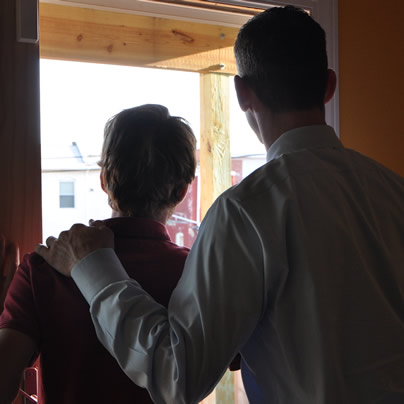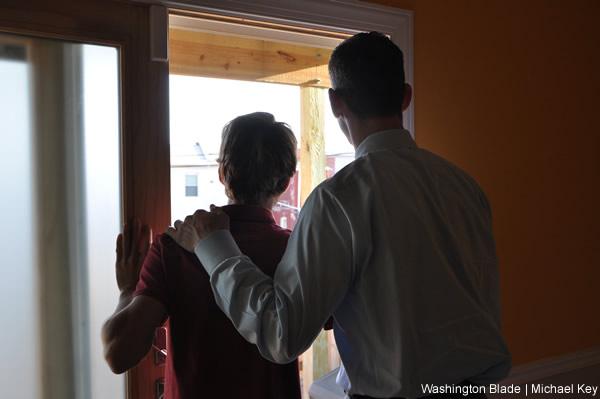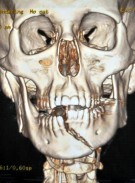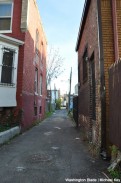Local
‘I remember being kicked, called faggot’
Victim recalls brutal attack, thanks community


The victim of a brutal anti-gay attack (left) underwent two surgeries in which his badly severed jaw was reattached with two permanent titanium plates. He spoke to the Blade this week on condition of anonymity and is pictured here at home with his partner. (Washington Blade photo by Michael Key)
A 29-year-old gay man spoke to the Blade Tuesday through jaws wired shut to facilitate the healing of facial injuries brought about by a brutal beating that extended over several streets near his home in Columbia Heights on March 12.
“It happened so fast,” said the man, who asked not to be identified out of fear of retaliation from his unidentified attackers, who remain at large.
“I remember being dragged. I remember being kicked. I remember being yelled at and being called faggot,” he said. “And my mind wants to say there were three of them, but it’s all flashes.”
Sitting beside his partner at the kitchen table of the couple’s home, the two said they decided to grant a series of news media interviews this week to draw attention to a rash of violent incidents against members of the LGBT community.
Both said their spirits were lifted when they learned one day earlier, on Monday, March 26, that D.C. police arrested a 27-year-old woman in connection with the March 11 shooting of a gay man at the International House of Pancakes restaurant in Columbia Heights.
They say police have told them investigators are hopeful they will soon identify the attacker in the 29-year-old gay man’s case and will make one or more arrests in the case.
The IHOP restaurant is about seven blocks from where the 29-year-old gay man was attacked at Georgia Avenue and Irving Street, N.W., one day later.
The man shot at the IHOP, said to be 31, suffered a non-life threatening gunshot wound to the abdomen. Witnesses said the shooting took place after the woman in custody, LaShawn Yvonne Carson, and two men with her called the victim anti-gay names and a scuffle broke out.
Similar to the incident involving the 29-year-old gay man who spoke to the Blade, police listed the shooting incident as a hate crime related to the victim’s perceived or actual sexual orientation.

The victim's jaw was broken in two places, requiring the insertion of two permanent titanium plates. (Courtesy image)
On the same day the 29-year-old gay man was beaten and robbed, a transgender woman was knocked unconscious at about 11:45 p.m. at West Virginia Avenue and Mt. Olivet Road, N.E. Police said they had insufficient evidence to list that incident as a hate crime, but they were looking into the possibility that it was.
The 29-year-old gay man and his partner said the two were also buoyed by a silent march organized by their friends that took place March 20, the day the 29-year-old beating victim was released from the hospital. As many as 700 people marched past where the attack against him took place after beginning the procession at the IHOP.
The victim said he was too weak to march after having spent eight days in the hospital. He underwent two surgeries in which his badly severed jaw, broken in two places by attackers who kicked him in the face, was reattached with two permanent titanium plates.
“It was stellar. It was reassuring,” he said of the march. “It makes me proud to be where I’m at — friends who I have in my life. And it gave me a lot of strength. It gave me a lot of security. It re-instills my faith in people.”
Although the attack against him began at Georgia Avenue and Irving Street, police said they found the victim four blocks away at Georgia and Morton Street. The victim said he recalls being dragged through an alley a short distance from Georgia Avenue after the initial attack.

The alley where the victim was allegedly dragged before being attacked by a second group and robbed of his iPhone and iPad. (Washington Blade photo by Michael Key)
He said minutes after the attackers appear to have left him alone, he called his partner on his cell phone to tell him he had been attacked and needed help. But the partner said he sounded dazed and couldn’t say where he was.
Seconds later, the partner heard other people speaking to the victim. The victim told the Blade he believes another group of attackers beat and robbed him, taking his iPhone and the iPad he had in the briefcase he was carrying.
“It was really hard to be attacked the second time and think that someone would do that,” he said.
“I just want to give thanks for the amazing support and outpouring that we’ve had from everyone lately,” he said. “It makes me proud to be part of the community that I belong to.”

In an official statement released at the reveal event Capital Pride Alliance described its just announced 2026 Pride theme of “Exist, Resist, Have the Audacity” as a “bold declaration affirming the presence, resilience, and courage of LGBTQ+ people around the world.”
The statement adds, “Grounded in the undeniable truth that our existence is not up for debate, this year’s theme calls on the community to live loudly and proudly, stand firm against injustice and erasure, and embody the collective strength that has always defined the LGBTQ+ community.”
In a reference to the impact of the hostile political climate, the statement says, “In a time when LGBTQ+ rights and history continue to face challenges, especially in our Nation’s Capital, where policy and public discourse shape the future of our country, together, we must ensure that our voices are visible, heard, and unapologetically centered.”
The statement also quotes Capital Pride Alliance CEO and President Ryan Bos’s message at the Reveal event: “This year’s theme is both a declaration and a demand,” Bos said. “Exist, Resist, Have Audacity! reflects the resilience of our community and our responsibility to protect the progress we’ve made. As we look toward our nation’s 250th anniversary, we affirm that LGBTQ+ people have always been and always will be part of the United States’s history, and we will continue shaping its future with strength and resolve,” he concluded.
District of Columbia
Capital Pride board member resigns, alleges failure to address ‘sexual misconduct’
In startling letter, Taylor Chandler says board’s inaction protected ‘sexual predator’

Taylor Lianne Chandler, a member of the Capital Pride Alliance Board of Directors since 2019 who most recently served as the board’s secretary, submitted a letter of resignation on Feb. 24 that alleges the board has failed to address instances of “sexual misconduct” within the Capital Pride organization.
The Washington Blade received a copy of Chandler’s resignation letter one day after she submitted it from an anonymous source. Chandler, who identifies as transgender and intersex, said in an interview that she did not send the letter to the Blade, but she suspected someone associated with Capital Pride, which organizes D.C.’s annual LGBTQ Pride events, “wants it out in the open.”
“It is with a heavy heart, but with absolute clarity, that I submit my resignation from the Capital Pride Alliance Board of Directors effective immediately,” Chandler states in her letter. “I have devoted nearly ten years of my life to this organization,” she wrote, pointing to her initial involvement as a volunteer and later as a producer of events as chair of the organization’s Transgender, Gender Non-Conforming, and Intersex Committee.
“Capital Pride once meant something profound to me – a space of safety, visibility, and community for people who have often been denied all three,” her letter continues. “That is no longer the organization I am part of today.”
“I, along with other board members, brought forward credible concerns regarding sexual misconduct – a pattern of behavior spanning years – to the attention of this board,” Chandler states in the letter. “What followed was not accountability. What followed was retaliation. Rather than addressing the substance of what was reported, officers and fellow board members chose to chastise those of us who came forward.”
The letter adds, “This board has made its priorities clear through its actions: protecting a sexual predator matters more than protecting the people who had the courage to come forward. … I have been targeted, bullied, and made to feel like an outsider for doing what any person of integrity would do – telling the truth.”
In response to a request from the Blade for comment, Anna Jinkerson, who serves as chair of the Capital Pride board, sent the Blade a statement praising Taylor Chandler’s efforts as a Capital Pride volunteer and board member but did not specifically address the issue of alleged sexual misconduct.
“We’re also aware that her resignation letter has been shared with the media and has listed concerns,” Jinkerson said in her statement. “When concerns are brought to CPA, we act quickly and appropriately to address them,” she said.
“As we continue to grow our organization, we’re proactively strengthening the policies and procedures that shape our systems, our infrastructure, and the support we provide to our team and partners,” Jinkerson said in her statement. “We’re doing this because the community’s experience with CPA must always be safe, affirming, empowering, and inclusive,” she added.
In an interview with the Blade, Chandler said she was not the target of the alleged sexual harassment.
She said a Capital Pride investigation identified one individual implicated in a “pattern” of sexual harassment related behavior over a period of time. But she said she was bound by a Non-Disclosure Agreement (NDA) that applies to all board members and she cannot disclose the name of the person implicated in alleged sexual misconduct or those who came forward to complain about it.
“It was one individual, but there was a pattern and a history,” Chandler said, noting that was the extent of what she can disclose.
“And I’ll say this,” she added. “In my opinion, with gay culture sometimes the touchy feely-ness that goes on seems to be like just part of the culture, not necessarily the same as a sexual assault or whatever. But at the same time, if someone does not want those advances and they’re saying no and trying to push you away and trying to avoid you, then it makes it that way regardless of the culture.”
When asked about when the allegations of sexual harassment first surfaced, Chandler said, “In the past year is when the allegation came forward from one individual. But in the course of this all happening, other individuals came forward and talked about instances – several which showed a pattern.”
Chandler’s resignation comes about five months after Capital Pride Alliance announced in a statement released in October 2025 that its then board president, Ashley Smith, resigned from his position on Oct. 18 after Capital Pride became aware of a “claim” regarding Smith. The statement said the group retained an independent firm to investigate the matter, but it released no further details since that time. Smith has declined to comment on the matter.
When asked by the Blade if the Smith resignation could be linked in some way to allegations of sexual misconduct, Chandler said, “I can’t make a comment one way or the other on that.”
Chandler’s resignation and allegations come after Capital Pride Alliance has been credited with playing the lead role in organizing the World Pride celebration hosted by D.C. in which dozens of LGBTQ-related Pride events were held from May through June of 2025.
The letter of resignation also came just days before Capital Pride Alliance’s annual “Reveal” event scheduled for Feb. 26 at the Hamilton Hotel in which the theme for D.C.’s June 2026 LGBTQ Pride events was to be announced along with other Pride plans.
District of Columbia
Capital Stonewall Democrats elect new leaders
LGBTQ political group set to celebrate 50th anniversary

Longtime Democratic Party activists Stevie McCarty and Brad Howard won election last week as president and vice president for administration for the Capital Stonewall Democrats, D.C.’s largest local LGBTQ political organization.
In a Feb. 24 announcement, the group said McCarty and Howard, both of whom are elected DC Advisory Neighborhood Commissioners, ran in a special Capital Stonewall Democrats election to fill the two leadership positions that became vacant when the officers they replaced resigned.
Outgoing President Howard Garrett, who McCarty has replaced, told the Washington Blade he resigned after taking on a new position as chair of the city’s Ward 1 Democratic Committee. The Capital Stonewall Democrats announcement didn’t say who Howard replaced as vice president for administration.
The group’s website shows its other officers include Elizabeth Mitchell as Vice President for Legislative and Political Affairs, and Monica Nemeth as Treasurer. The officer position of secretary is vacant, the website shows.
“As we look toward 2026, the stakes for D.C. and for LGBTQ+ communities have never been clearer,” the group’s statement announcing McCarty and Howard’s election says. “Our 50th anniversary celebration on March 20 and the launch of our D.C. LGBTQ+ Voter’s Guide mark the beginning of a major year for endorsements, organizing, and coalition building,” the statement says.
McCarty said among the organization’s major endeavors will be holding virtual endorsement forums where candidates running for D.C. mayor and the Council will appear and seek the group’s endorsement.
Founded in 1976 as the Gertrude Stein Democratic Club, the organization’s members voted in 2021 to change its name to Capital Stonewall Democrats. McCarty said the 50th anniversary celebration on March 20, in which D.C. Mayor Muriel Bowser and members of the D.C. Council are expected to attend, will be held at the PEPCO Gallery meeting center at 702 8th St., N.W.
-

 Federal Government4 days ago
Federal Government4 days agoTwo very different views of the State of the Union
-

 Virginia4 days ago
Virginia4 days agoVa. activists preparing campaign in support of repealing marriage amendment
-

 Opinions4 days ago
Opinions4 days agoThe global cost of Trump’s foreign aid ideology
-

 Movies3 days ago
Movies3 days agoMoving doc ‘Come See Me’ is more than Oscar worthy

















